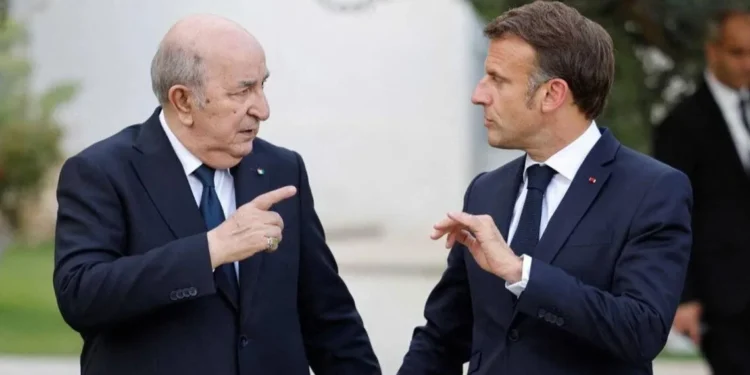The diplomatic crisis between France and Algeria has reached new heights after France recalled its ambassador and ordered the expulsion of 12 Algerian diplomats. This latest move follows a series of escalating tensions between the two countries, ignited by the arrest of an Algerian consular official in Paris last week.
Algerian authorities had detained the consular staffer along with two other individuals in connection with the April 2024 kidnapping of Amir DZ, a prominent Algerian social media influencer and outspoken critic of the Algerian government. The abduction, which took place in Paris, resulted in Amir DZ being held for hours before being released in a forest. The arrest of the consular official triggered a furious response from Algiers, which swiftly expelled 12 French diplomats, accusing them of acting under the supervision of France’s interior ministry.
France Responds: “Unjustified and Incomprehensible”
France, angered by Algeria’s actions, has strongly condemned the expulsion, calling it “unjustified and incomprehensible.” President Emmanuel Macron’s office expressed outrage at the severity of Algeria’s response, and French Foreign Minister Jean-Noël Barrot remarked, “Algerian authorities have chosen escalation.” The French government also took the step of recalling its ambassador, Stéphane Romatet, for consultations, signaling the seriousness with which Paris views the situation.
“We will be bringing the ambassador back within 48 hours,” Barrot stated. “But make no mistake, if we want results for the French people, sooner or later, we’ll have to have a frank, level-headed, and challenging dialogue with Algeria.”
A Long-Standing Diplomatic Rift
The current diplomatic showdown between France and Algeria is the culmination of months of growing tensions. Experts have labeled this crisis as unprecedented, marking a dramatic deterioration in relations between the two nations since Algeria gained independence from France in 1962. The tensions were already simmering due to a series of political disagreements, but the situation reached a breaking point after a contentious episode last year.
In 2024, French President Macron’s announcement that France would recognize Moroccan sovereignty over the Western Sahara territory and support a limited autonomy plan for the region infuriated Algeria. The North African country has long been a staunch ally of the pro-independence Polisario Front in the Western Sahara conflict. The diplomatic rift was further aggravated by the arrest of French-Algerian novelist Boualem Sansal in November, who was detained at Algiers airport and later sentenced to five years in prison for remarks deemed harmful to Algeria’s national security.
A Battle Over Responsibility
The diplomatic bickering has now extended beyond these long-standing issues to the specifics of the consular official’s arrest. Algerian officials have expressed outrage over what they consider an unjust humiliation, with Sofiane Chaib, Algeria’s Secretary of State, calling the situation a “fabricated” issue created by French Interior Minister Bruno Retailleau. Chaib accused Retailleau of exacerbating tensions, claiming that relations were in a “phase of warming up” before his involvement.
In an interview with Algerian state television, Chaib laid the blame squarely at Retailleau’s feet, stating that “Retailleau has full responsibility for this new situation,” adding that the rationale behind the arrest was “grotesque”. The French minister, in turn, rejected these accusations, asserting, “It is unacceptable that France is a playground for Algerian intelligence.”
Ongoing Diplomatic Struggles
Despite these high-level exchanges, there has been little indication that the crisis will abate anytime soon. Relations between the two countries deteriorated further after French officials, led by Retailleau, sought to deport roughly 60 Algerians deemed “dangerous” by the French Interior Ministry. In February, a knife attack in the eastern city of Mulhouse sparked outrage in France, with Retailleau accusing Algeria of failing to honor its obligations in removing these individuals. “This attack would not have happened if Algeria had respected the law,” Retailleau argued.
In response to this and other tensions, Macron had made a concerted effort to clear the air with Algerian President Abdelmadjid Tebboune. A “long, frank, and friendly exchange” between the two leaders took place late last month, and French Foreign Minister Jean-Noël Barrot followed this up with a visit to Algiers, hoping to reduce tensions. “France wishes to turn the page on current tensions,” Barrot said during his visit. However, despite these efforts, the diplomatic situation continues to worsen.
The Way Forward
As both sides dig in their heels, the path forward remains uncertain. France and Algeria have blamed each other for the escalation, with Paris accusing Algeria of escalating tensions and Algiers pointing the finger at French internal politics. While Barrot has emphasised the need for continued dialogue, the two countries seem caught in a cycle of recrimination and mistrust that is unlikely to end without further diplomatic efforts.



